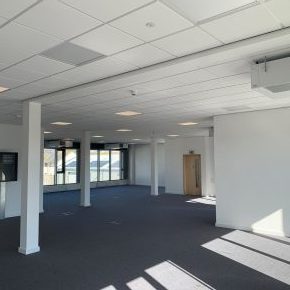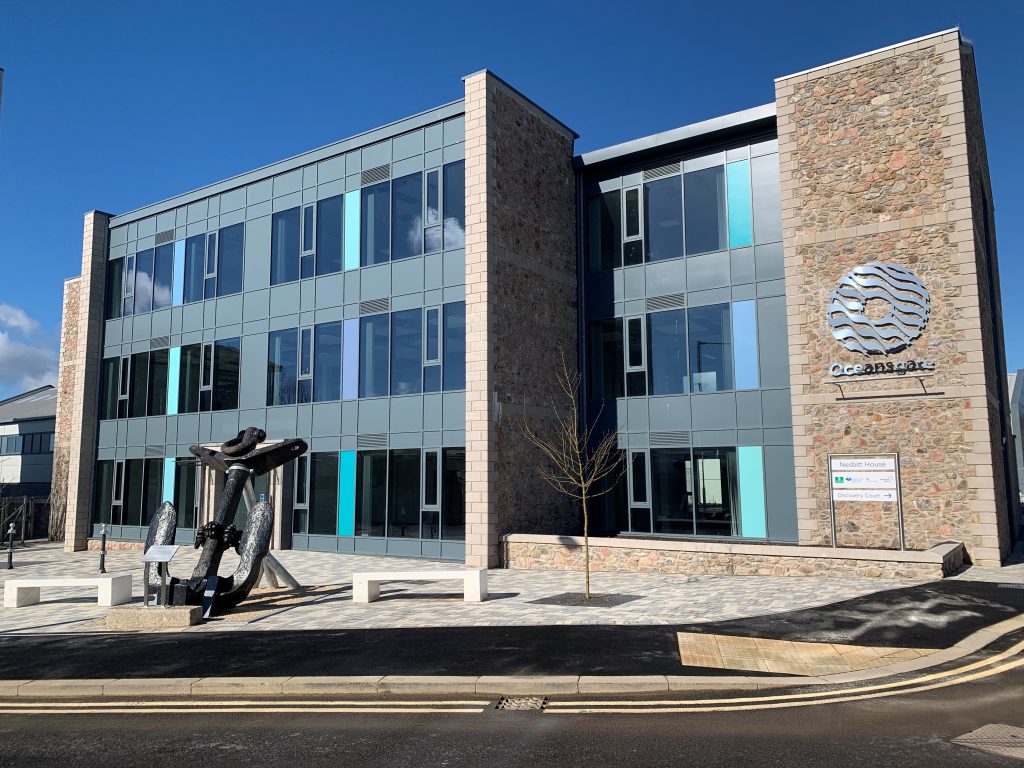
Breathing Buildings Provides Hybrid Ventilation to Oceansgate in Plymouth
Breathing Buildings, the UK’s leading provider of controlled hybrid ventilation systems, has supplied a ventilation system to a newbuild office development, Oceansgate, in Plymouth. With a location on former MOD land next to Devonport Dockyard, Oceansgate brings together marine-based businesses in a collaborative environment.
Breathing Buildings was specified by the design team to provide a hybrid ventilation system to serve the open-plan office spaces and several cellular offices for each of the three floors. Within the project 24 Breathing Buildings NVHR 900 units were installed, plus the company also supplied external weather louvres which were glazed into the curtain walling system.

Breathing Buildings worked with mechanical contractors Murch & Baker and the main contractor on the project, Kier Construction, to assist on the design. They carried out thermal modelling using their in-house design software, 4D-Flo, and Breathing Buildings modelled the design to CIBSE Guide A / TM52 summer overheating criteria, using the typical CIBSE DSY weather file for Plymouth, ensuring a comfortable working environment for occupants as well as good indoor air quality (IAQ).
‘A healthy office environment’
Paul Murch, Director at Murch & Baker Ltd, comments: “We have been working with Breathing Buildings for over a decade now and so we are well aware of the many benefits that hybrid ventilation brings.
“The ventilation systems we have installed at Oceansgate are providing a healthy office environment, that monitors and manages carbon dioxide levels as well as providing good indoor air quality and comfortable temperatures year-round.”
Breathing Buildings’ NVHR units control the indoor air quality by reducing the levels of carbon dioxide (CO₂), which is particularly important during winter when windows are kept shut. Here, the NVHRs constantly monitor the air and bring in just enough fresh air to maintain a healthy and comfortable indoor environment where CO₂ levels do not rise above 1,000 parts per million.
Algorithms
The algorithms within the NVHR software carefully blend varying volumes of heated internal room air with incoming cold air to avoid creating any cold draughts and to reduce the amount of time that the heating systems needs to be on. Breathing Buildings supplied its own controls for the project and the NVHRs are fully integrated with the building management system (BMS) which allowed the head-end of the BMS system to monitor the temperatures and CO₂ levels in each of the spaces.
In addition to the Breathing Buildings units, there are some manual opening windows to assist with ventilation on the hottest of days and reduce the amount of time that the NVHRs need to operate whilst increasing the number of hours that the system could operate as a free-running natural ventilation system.
A night-time cooling strategy was also incorporated to help cool the building after the occupants had left for the evening by introducing a controlled amount of cooler air during the night time. This ensures, at the start of each day, the internal spaces are comfortable and fresh and then comfort levels can be maintained internally throughout the day under most external conditions.
The NVHR® (Natural Ventilation with Heat Recycling) hybrid ventilation system’s patented ultra-efficient facade-based mixing ventilation allows single-sided, enhanced natural ventilation in deep plan spaces whilst making the most of internal heat gains to deliver superb thermal comfort and indoor air quality. Hybrid ventilation focuses on the vital balance of indoor air quality, thermal comfort and efficiency. The NVHR® tackles energy efficiency and environmental issues and provides excellent indoor air quality.
Next generation
Breathing Buildings’ energy efficient NVHR® is the next generation of energy efficient hybrid ventilation, offering almost 50% reduction in energy savings and so operating costs. NVHR® comprises both natural and mechanical ventilation. Allowing low-energy hybrid natural ventilation, even in buildings with limited facade and roof space, highly efficient mixing fans mitigate cold draughts in winter and provide a ventilation boost in summer.
Fitted with external and internal temperature sensors and an intelligent controller, the system monitors conditions to create an ideal indoor environment, boosting both productivity and wellbeing. NVHR® optimises indoor air quality, comfort and efficiency by automatically switching between natural, hybrid and mechanical ventilation, maximising benefits.
It is suitable for use in almost any building due to its small size and is deployable in offices, meeting rooms, schools, public areas and other deep plan spaces.
NVHR® has three modes: Summer mode, Winter mode and Summer boost. In winter the heat recycling strategy for ventilation offers huge heating-bill savings while providing good ventilation. The mid-season natural ventilation mode enables the unit to maximise the benefits of passive ventilation. The Summertime boost function fully opens the unit’s damper to maximise ventilation and cooler air.
Latest news

28th March 2025
Ideal Heating Commercial announces 10-year warranty on Evomax 2 boiler
Evomax 2, the UK’s number one selling commercial wall-mounted boiler from Ideal Heating Commercial, is now available with a 10-year warranty.
Posted in Articles, Building Industry News, Building Products & Structures, Building Regulations & Accreditations, Building Services, Facility Management & Building Services, Heating Systems, Controls and Management, Heating, Ventilation and Air Conditioning - HVAC, Innovations & New Products, Pipes, Pipes & Fittings, Plumbing, Retrofit & Renovation, Sustainability & Energy Efficiency, Videos
28th March 2025
FLIR Si1-LD Acoustic Imaging Camera for Compressed Air Leak Detection
FLIR, a Teledyne Technologies company, introduces the Si1-LD, an industrial acoustic imaging camera that brings faster and more accurate compressed air leak detection to those operating on a modest condition monitoring budget.
Posted in Acoustics, Noise & Vibration Control, Articles, Building Industry News, Building Products & Structures, Building Services, Facility Management & Building Services, Information Technology, Innovations & New Products, Retrofit & Renovation, Sustainability & Energy Efficiency, Thermal Imaging and Monitors
28th March 2025
LIFTEX 2025 Seminar programme announced
Registration has opened for LIFTEX 2025. Now in its 37th year, LIFTEX 2025 is the UK’s only dedicated exhibition for the lift, escalator and access industry and takes place only once every three years.
Posted in Access Control & Door Entry Systems, Accessibility, Articles, Building Industry Events, Building Industry News, Building Products & Structures, Building Regulations & Accreditations, Building Services, Exhibitions and Conferences, Facility Management & Building Services, Health & Safety, Retrofit & Renovation, Security and Fire Protection, Seminars
28th March 2025
MCRMA welcomes ArcelorMittal UK to membership
A UK division of the global steelmaking business ArcelorMittal has become the latest new member of the MCRMA, the industry association representing the metal building envelope sector.
Posted in Articles, Building Associations & Institutes, Building Industry News, Building Products & Structures, Building Systems, Cladding, Facades, Posts, Restoration & Refurbishment, Retrofit & Renovation, Roofs, Steel and Structural Frames, Walls
 Sign up:
Sign up: